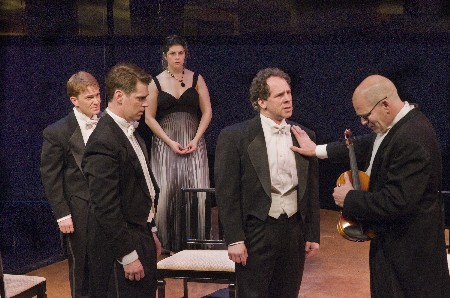Theater Review: A Listenable ‘Opus’
“Musicians take all the liberties they can.” — Ludwig Von Beethoven
Opus by Michael Hollinger. Directed by Jim Petosa. Staged by the New Repertory Theatre at the Arsenal Center for the Arts, Watertown, MA, through April 17.

l. to r. Shelley Bolman (Alan), Michael Kaye (Elliot), Becky Webber (Grace), Benjamin Evett (Dorian), and Bates Wilder (Carl) in Opus. Photo by Andrew Brilliant/ Brilliant Pictures.
Reviewed by Bill Marx
In Opus, dramatist Michael Hollinger belies Beethoven’s frustrated observation about the free-wheeling nature of musicians. Frankly, one wishes that he had taken more liberties with the ornery members of the feudin’, fussin’ string quartet at the center of his entertaining but stubbornly square-jawed play. A few atonal jabs would have usefully ruffled the all-too-neat surface.
The overarching philosophical quandary is the old creative tussle between two forms of aesthetic egoism: Apollo and Dionysus. The originators of the Lazara Quartet, musicians and lovers Elliot (violin) and Dorian (viola), are diametrically opposed creative spirits. The former is rigorous but controlling, the latter an inspired but tortured soul whose erratic mental state calls for medication.
Dorian’s creative fits of fancy generate chaos, yet take the group to dizzying new musical heights; Elliot’s tight reins of professionalism offer the reassurances of dependability but strangle independence as well. The sweet harmony provided by empathy or plain old modesty appears to be in short supply.
At the beginning of the play, Dorian has mysteriously left the group and a young female musician, Grace (viola), is being hired to take his place. That is good news for Alan (violin), who has an eye for the ladies, while the steady family man, the patient Carl (cello), just wants to keep the group up and running—he has apparently beat his cancer into remission. For Elliot, the new member gives him an opportunity to tighten his demanding grip on the management of the group.
The set up is clear: the four tempestuous egos that make up the celebrated Lazara String Quartet will battle over sex and power, with plenty of neurotic conniptions and temper tantrums along the way. But its informed vision of creative and libidinal conflict never surprises or challenges because the script clings to a staid predictability until it jumps off the rails in an overwrought ending.
The script’s contrasting personalities are kept in a too-neat dramatic check, as if Hollinger wrote the script in a finicky frame of mind. The characters spin in a mild, melodramatic grooves, with what’s propelling their vendettas and depressions spelled out reassuringly for the audience. Music from Beethoven and others are integrated into the play, tidily accenting the thorny personalities in the group and their clashes.
The play is at its best when it provides compelling insights into the stormy fertility of the rehearsal process, the bumpy blend of personalities and skills that make up a great string quartet and the debilitating grind of creative work.
Lazara accepts a concert at the White House, figuring that the televised gig will rev up its box office, though none of the members of the quartet have much liking for George W. Bush. The piece it chooses to play, the demanding Beethoven quartet (Op. 131), wouldn’t seem to be acceptable for such a pop culture occasion, but apparently Lazara pulls it off.
Suffice it to say that all the interlocking tensions and jealousies come to a head with an overstuffed series of last minute revelations that won’t jolt anyone familiar with soap opera formulas about jilted lovers, hankering ambition, and cancer patients. It is too much high decibel passion too late.
The New Repertory production is smooth and economical, directed with transparent vim and vigor by Jim Petosa on Cristina Todesco’s admirably sleek set. Michael Kaye as Elliot and Benjamin Evett as Dorian provide skillful performances, usually skirting caricature, though their dramatic collisions never explode—they are contraries that do not strike reverberating sparks. Becky Webber is too wan as Grace—her diffidence dampers the frustrated erotic vibes of Shelley Bolman’s Alan. Bates Wilder is all stalwart sanity as Carl, until the actor has to serve up unconvincing last minute hysterics.
Opus is listenable but much too well-tempered to dive deep into the fascinatingly murky relationship between group dynamics and the madness of art.
Tagged: Arsenal Center for the Arts, Benjamin Evett, Jim Petosa, Michael Hollinger, New Repertory Theatre
